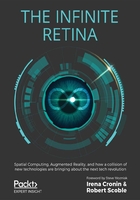
The Frustrated Pioneer
Doug Engelbart had a frustrated spirit when we first talked with him in 2005. If you search YouTube for "mother of all demos," you'll find the video of him demoing something that looked like the Macintosh. He guided a mouse cursor across the screen and showed off many new computing concepts that would dramatically change how we would view and use computing. The official title was "A research center for augmenting human intellect." Way back in 1968. Almost 20 years later, the Macintosh was born from many of the ideas he demonstrated in that demo. He later went on to win many awards and accolades, but he was particularly proud of the National Medal of Technology, United States' highest technology award, yet here, he was sharing his frustration that he wouldn't be around to help humans see what he told us would be his most important work: augmenting human beings. In other words, giving them the tools to make themselves better.
"Why are you frustrated?" we asked him. That led to a discussion of how Engelbart was kicked out of his own research lab back in the 1970s (which is the same lab, SRI International, then named Stanford Research Institute). This is the lab that brought us Siri, HDTV, and played key roles in many, many other things, including the internet itself). Some of his coworkers say that he was too focused on the future and not on getting revenue for the lab, but Engelbart answered "people don't understand what I'm saying." He explained that he was dreaming of a better future, where humans and machines would join together. In one trip, he pulled out a glove that would let people touch and type faster than on keyboards.

Photo credit: Robert Scoble. Robert Scoble's son, Patrick, talks with Douglas Engelbart and plays with the original mouse.
When asked why they didn't understand, he answered that for that, you have to go back to the context of the day. Back in the 1970s, before personal computers came along, computers were run by either data entry clerks or by PhDs and other highly trained people who wrote the code that ran them. When he told his coworkers and others that someday we'd have a supercomputer in our hands, he was laughed off as a crackpot.
He had always dreamed of a world decades away and talked with us about how computers would soon lead to different realities. As the inventor of the original mouse, he was always looking for ways for humans to use computers better than typing on a keyboard or stacking piles of punch cards into trays, which is what most computer users back in the 1960s were doing. Today, we all use the progeny of his work, and this pioneering spirit of dreaming of a better world, where humans would have better control of the technology they invented, continues to drive us to new and greater innovations.
His idea was that computing could go beyond merely performing calculations, and that it could be used to augment the capabilities of the human mind. Why was he frustrated? Because even as he was in the final phases of his life, he could see a world where people would see or sense computing all around them and be able to touch it, maybe with gloves, but hopefully, he told us, with sensors that could see the human hands, eyes, and maybe someday into their minds.
These are ideas that even today aren't largely used or popular. Virtual Reality has only sold a few million headsets at the time of writing this book. Most humans haven't had even an hour in one of those, and here this man is telling us about a world he saw way past Virtual Reality to one where computing was on every surface and where you could use your hands, eyes, voice, to control it! His thinking on this topic led him to develop what came to be known as Engelbart's Law: that computing was increasing at an exponential rate, so we would be able to exponentially increase our performance as well. We are seeing this become one of the key drivers behind the development of the technology we see about to disrupt seven industries, and probably more.
He saw a world where we would soon have technical capabilities beyond the imaginations of most people; for instance, cars that could drive themselves, or systems that would let us see a new digital layer making our understanding of the world far better than before. His ideas of augmenting human performance through technology changed all of our lives, and soon will bring us both new powers and a new understanding of what it means to be human, but to do that, he needed to wait for our machines to get new senses. We wonder if even Engelbart himself, though he usually was decades ahead of others in his thinking, could have imagined the 3D sensors that are now in our phones and cars. Could he imagine the databases and cultural changes that they are now bringing? Knowing how he thinks, he might resist some things for a few microseconds but then he'd smile, lose his frustration, and see that someone else is pushing the world toward his ideas. Let's meet one of these people now.